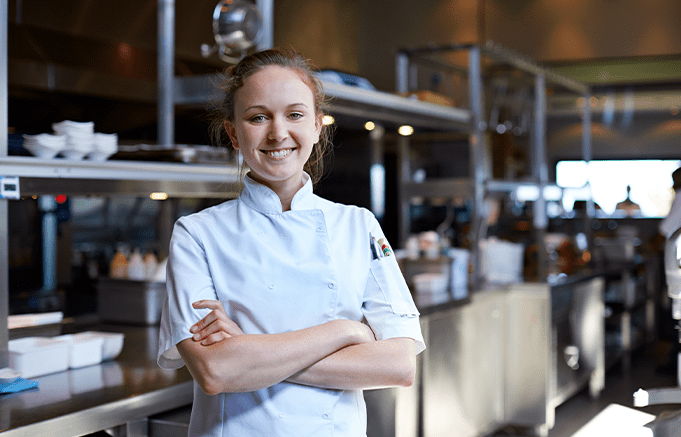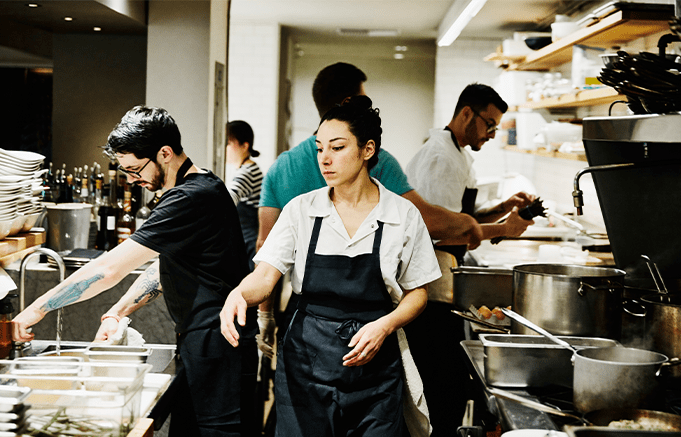Consultant chef: a comprehensive guide

There are many different roles in the culinary world. If you're looking at a career in the culinary arts, you have probably come across the role of consultant chef, but you might not be sure what exactly a consultant chef does.
In this article, we will go over everything to do with the consultant chef role, including what they do, how to get this role, and what kind of challenges someone can expect while working as a consultant chef.
Introduction to consultant chef
Within a professional kitchen setting or the wider culinary world, you will find a lot of different chef careers. While all of these roles will have an impact on the food service that a restaurant, hotel, or bar offers, they will all have different tasks and responsibilities. However, consultant chef is one of the most important roles in the industry, and it can be an exciting career for people to aspire to.
What is a consultant chef?

A consultant chef is someone who uses their skills, knowledge, and expertise to help businesses in the food industry solve any issues they have. Consultant chefs will also help improve businesses and help them stay modern and relevant, or they might help restaurants find their unique themes and unique selling points.
Whether a business is struggling with its kitchen operations or just needs to stay ahead of the curve on food trends, a consultant chef is the person that they turn to. This makes it one of the most rewarding culinary careers for people who love problem-solving.
While a lot of chefs work for a particular restaurant, hotel, or another venue, a consultant chef will often be approached by these businesses for advice, rather than working within the company already. Some businesses, such as luxury hotel chains, might have a consultant chef that oversees all the restaurants in their chain.
Detailed explanation of responsibilities and tasks
The tasks and responsibilities of a consultant chef can be varied. They can include:
- Food innovation and menu development
- Recipe testing and recipe creation
- Recipe standardization across multiple locations within the same chain
- Setting food safety measures and food quality control procedures
- Developing protocol for proper kitchen efficiency
- Checking food cost management is handled correctly
However, this is not a comprehensive list. A chef consulting for a business could give advice on kitchen design, kitchen staffing, and more.
What is the difference between a consultant chef and a head chef?
A head chef is usually the highest chef role within a professional kitchen, though there might be an executive chef in larger kitchens. Either the head chef or executive chef will be involved in kitchen management, food cost analysis, food service management, and more. This is again a very rewarding role for people who want to work in hospitality management.
A consultant chef will look at many of the issues listed above. However, a culinary consultant will often not be working for the business initially. They will be asked to come in and help bring new ideas to the restaurant or help solve problems before moving on to new jobs.
Can a consultant chef work independently or only through a consultancy firm?
Many consultant chefs work through consultancy agencies, but not all. Some consultant chefs work independently. However, working independently can make it harder to get jobs, since people will often turn to larger consultancy firms.
It can also be a challenge to build a reputation as a reliable consultant if you are working on your own. Most consultant chefs that work independently will spend a few years working with a firm to build their reputation.
Importance of a consultant chef in modern-day cuisine

The world of restaurants and catering services is highly competitive, and if companies want to get ahead, they need to make sure that everything runs smoothly, and that they offer something that customers will want.
This is why consultant chefs are so important. They can help businesses improve their kitchen productivity, and make sure their menu engineering and food presentation are handled well. All of this helps improve the success and profit of the restaurant.
Future outlook for the consultant chef industry
The culinary industry is showing no sign of slowing down, and it's quite likely that competition will remain fierce. This means that innovation and constant analysis will remain very important moving forward.
More and more restaurants are opening all the time, so there could be even more opportunities for consultant chefs in the future.
How to become a consultant chef
If you're interested in becoming a consultant chef, there are different routes that you can take.
Education and training requirements
Becoming a culinary consultant requires extensive culinary training as well as business management education. This is because the role of consultant chef means giving advice on everything from kitchen staff management to budgets and menu planning, so you need varied skills. Several institutions offer this education, including our culinary school in France.
Transform your career by studying consultant chef skills with Ducasse
With internships, culinary skills training and business management studies, this bachelor's degree will set you up for success as a consultant chef
Certifications and accreditation
There is a range of qualifications that can help you get ahead in the demanding field of the culinary arts. Ideally, you should get certification in both culinary skills as well as business acumen. Of course, different countries might have different certifying bodies, so you should look at what certifications are required where you intend to work.
Essential skills and qualities
There are many vital skills that you need as a consultant chef. These include:
- Problem-solving
- Analysis skills
- Communication
- Organizational skills
- Creativity
Relevant experience and portfolio building
Many consulting firms will expect you to have a varied range of experience working in professional kitchens and food environments, both as a professional chef and in a restaurant management role.
This could be gained in a range of different venues, including working in restaurants, hotels, bars, or catering companies. It could also come from a selection of roles, such as head chef, pastry chef, or restaurant manager.
Networking and professional development
It can be beneficial to network and make contact with other people in the field. Consultancy often means having to find clients who need help, so making sure you have a wide network of people who might need your services is useful. It can also help you get jobs with consultancy firms.
How do I become a consultant chef with no prior experience?

If you're worried about getting a consultant chef role without having experience, you should focus on getting an excellent educational foundation for your career. Qualifications can help show that you have the determination, skills, and knowledge needed for the profession.
Transform your career with world-class training in the culinary arts
Our intensive diplomas are ideal for career changers or anyone who wants to take their culinary career to the next level
What is the average salary of a consultant chef?
The salary you can expect as a consultant chef depends on several factors, including where you work, your experience, and whether you're employed by a consultancy firm or as an individual. However, as a rough guide, you could expect salaries like these.
|
Country |
|
|
France |
€39,000 to €101,000 |
|
United Kingdom |
£71,500 to £68,500 |
|
United States |
$30,000 to $77,000 |
Challenges faced by consultant chefs
While being a consultant chef can be an exciting and satisfying career, there are some challenges that you will face in this role. For the right person, these challenges can add to the rewards.
Balancing creativity and commercial viability
Great dining experiences are artistic in nature, and there is a great deal of creativity in, for example, assessing food presentation techniques. However, you will also need to balance the commercial viability of what you suggest to restaurants. Ultimately, restaurants need to make money, so you must help businesses ensure that they are going to be profitable.
Managing kitchen staff and maintaining high standards
A large part of chef consultancy is ensuring that all aspects of restaurant management run smoothly. This includes managing staff and making sure that proper protocols are in place to ensure rigorous health and safety as well as a reliable level of service. This can be a challenge, especially in some sectors of the restaurant industry.
Staying ahead of industry trends and innovations
The food industry is constantly evolving, with new ideas, preferences, developments, and innovations. In order to stay popular and profitable, restaurants need to stay up-to-date. This means that consultant chefs must always be aware of the latest trends and they need to research the latest innovations for their food product development tasks.
Maintaining work-life balance
As with any management role, it can be tricky to make sure that you have a good work-life balance. In a consultancy role, this can be even more challenging since there can be an expectation to work excessively long hours.
However, keeping to designated working hours and ensuring you have time off from work can help. On the plus side, consultancy roles can also mean more hours worked during the daytime, unlike many other chef roles.
Chef consultancy can be a stressful job, with tight deadlines under pressure. There is also an expectation that you will improve things for businesses that hire you, which can be stressful.
This is why organizational skills are important, as they'll help you make sure that you stay on top of things. It's also important to make sure you have good time management and sound analytical thinking to make sure that you can handle all the deadlines you might have.
Conclusion
Consultant chefs help food businesses improve, adapt, and become more profitable. This includes advising with everything from kitchen equipment management to menu planning. It is a very varied role and can be very rewarding for people who enjoy problem-solving and who have good analytical skills.
The role of a chef consultant requires a lot of skills and experience, both in the culinary arts and business management, but it can be an exciting and well-paid position. One of the best ways to start this kind of career is to look at getting into culinary school. You might also want to consider if being a chef is a good career for you.



